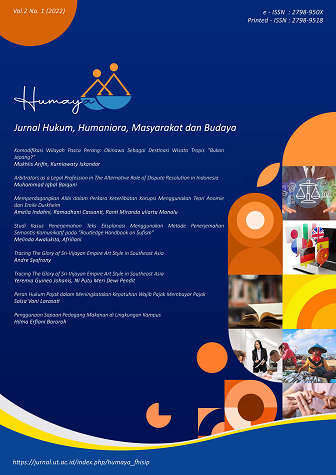Legal Due Diligence of Fintech Agreement Law Transformation of Economic Recovery in the New Normal Era
DOI:
https://doi.org/10.33830/humaya.v1i2.1870.2021Keywords:
Legal Transformation, Due Diligence, Economic RecoveryAbstract
Today, business transactions no longer have to be carried out face to face, instead through virtual or in a virtual world that is connected globally. One of the economic activities that affect the public interest is the activity of channeling funds which must be carried out fairly and in accordance with Article 33 paragraph (4) of the 1945 Constitution, namely the economy. Financing Institutions have undergone a process of digitization, plus during the Covid-19 pandemic experienced a high surge in business capital needs so that financing transactions can be easily accessed online, financial technology (fintech) services are regulated in OJK Regulation No.77 / POJK.01 / 2016 concerning Borrowing Services Information Technology-Based Borrowing If the provider of Information Technology-Based Borrowing and Lending Services has been proven to have committed a violation, it may result in imposing sanctions on the agreement. The purpose of this research is to contribute from a conceptual perspective of business law in fulfilling economic recovery and to find out about sanctions arrangements for Fintech service providers in order to achieve legal certainty. The research method used is through normative law and conceptually socio legal. The results of this research analysis are expected that business people want to invest in a company with a fast process, so the need for Fintech services is to be able to transform in a Legal Due Diligence so that the economic recovery of a new national era is held based on economic democracy using the principles of togetherness, justice, sustainability, environmental awareness, independence. Legal Due Deligence is able to be a solution to minimize potential risks in the future. So that it will get benefits for finctech organizers and the public who use services as a result of the positive influence due to the Legal Due Deligence business concept.
References
Ali, Z. (2011). Metode Penelitian Hukum. Sinar Grafika.
Cahya, Kadek Adnan Dwi; Kasih, Desak Putu Dewi; Sutama, I. B. P. (2018). Penerapan Prinsip Customer Due Diligence dan Enhanced Due Diligence dalam Pencegahan Pencucian Uang pada Bank Rakyat Indonesia. Kertha Semaya: Journal Ilmu Hukum, 5(1). https://doi.org/https://ojs.unud.ac.id/index.php/kerthasemaya/article/view/43505
Dewi Sartika Saimima , I., & G. P. (2021). The Fintech Phenomenon: Protection of Consumer Privacy Data in Online Lending. Jurnal Kajian Ilmiah, 21(2), 185-194. https://doi.org/https://doi.org/10.31599/jki.v21i2.564
Dwi Nugrahayu Devianti, Prija Djatmika, S. S. (2020). The Risks of Personal Data Theft in Fintech-Based Online Loan Applications Due to the Absence of Law in Indonesia. Jurisdictie, 11(2), 9-21. https://doi.org/https://doi.org/10.18860/j.v11i2.7921
Freedman, D. M. D. M. R. N. (2015). Equity Crowdfunding for Investors: A Guide to Risks, Returns, Regulations, Funding Portals, Due Diligence, and Deal Terms. John Wiley & Sons Inc.
Herowati Poesoko, A. A. S. L. D. (2020). The Role of Legal Opinion as Legal Problem Solving Method. Sociological Jurusprudence Journal, 3(1), 19-27. https://doi.org/https://doi.org/10.22225/scj.3.1.1513.19-27
Istiqamah. (2019). Analisis Pinjaman Online oleh Fintech dalam Kajian Hukum Perdata. Jurisprudentie, 6(2), 15-25. https://doi.org/https://doi.org/10.24252/jurisprudentie.v6i2.10501
Marta Widian Sari, A. N. (2020). Analyzing Several Factors that Influence People to Make Loans Online. JhSS: Journal of Humanities and Social Studies, 4(2). https://doi.org/10.33751/jhss.v4i2.2492
Silalahi, A. K. (2021). Urgensi Undang-Undang Fintech: Peer To Peer Lending (P2p) terkait Pandemi Covid-19. Jurnal Um-Tapsel, 8(1), 283-304. https://doi.org/http://dx.doi.org/10.31604/justitia.v8i1.283-304
Sitompul, M. G. (2018). Urgensi Legalitas Financial Technology (Fintech): Peer to Peer (P2p) Lending di Indonesia. Journal Article Public Jurnal Yuridis UNAJA, 10(5). https://doi.org/10.5281/jyu.v1i2.428
Soekanto, S. (2010). Pengantar Penelitian Hukum. UII Press.
Vedian, I. (2017). Penerapan Costumer Due Dilligence (CDD) dalam Pencegahan Pendanaan Terorisme melalui Perbankan. Jurnal Hukum Bisnis Dan Investasi, 7(2), 74-87. https://doi.org/10.28932/di.v7i2.717
Downloads
Published
How to Cite
Issue
Section
License
Copyright (c) 2021 Yapiter Marpi

This work is licensed under a Creative Commons Attribution 4.0 International License.




